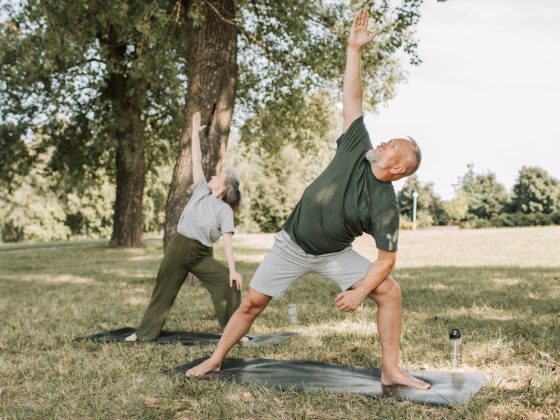In our fast-paced, modern world, maintaining mental clarity can often feel like a challenge. With endless distractions, growing responsibilities, and heightened stress levels, many people struggle to stay focused and sharp. However, one of the most effective ways to boost mental clarity is often overlooked: exercise.
Physical exercise has profound effects not just on the body but also on the brain. Studies have shown that regular exercise can improve cognitive function, enhance memory, reduce stress, and increase creativity. This guide will explore the best exercises that boost mental clarity, explaining the science behind why they work and how to incorporate them into your daily routine for maximum benefit.
The Connection Between Exercise and Mental Clarity
Before diving into specific exercises, it’s essential to understand how physical activity impacts the brain. When you exercise, several biological processes occur that contribute to improved mental function:
- Increased blood flow to the brain: Exercise stimulates blood circulation, which delivers oxygen and nutrients to the brain. This supports the growth of new neurons and enhances cognitive performance.
- Boosted production of neurotransmitters: Physical activity increases the release of chemicals such as dopamine, serotonin, and norepinephrine, which play key roles in mood regulation, focus, and overall brain function.
- Reduction in stress hormones: Regular exercise reduces the production of cortisol and other stress hormones, helping to decrease anxiety and improve concentration.
- Neuroplasticity: Exercise promotes the growth of new connections between neurons, a phenomenon called neuroplasticity. This helps improve learning, memory, and problem-solving abilities.
Best Exercises That Boost Mental Clarity
1. Aerobic Exercises (Cardio)
Why it works: Aerobic exercises, such as running, swimming, cycling, and brisk walking, are well-known for their cardiovascular benefits, but they also have a profound impact on mental clarity. Studies have shown that consistent aerobic exercise can lead to the growth of new brain cells in the hippocampus, a region associated with memory and learning.
How to incorporate it: Aim for at least 150 minutes of moderate-intensity aerobic exercise each week. This can be broken down into 30-minute sessions, five times a week. Activities like jogging in a park, biking, or swimming laps at your local pool can help.
Mental clarity benefits:
- Increases focus and concentration
- Improves memory retention
- Reduces brain fog
Pro tip: If you’re pressed for time, high-intensity interval training (HIIT), which alternates between short bursts of intense exercise and brief recovery periods, can offer similar benefits in a shorter duration.
2. Yoga
Why it works: Yoga is not just about flexibility and strength; it’s an excellent practice for mental clarity. Yoga combines physical poses, breathing techniques, and meditation, all of which reduce stress and improve focus. By encouraging mindfulness, yoga can help you stay present in the moment, which is key for mental clarity.
How to incorporate it: You can start with a basic yoga class or follow online videos. If you’re new to yoga, beginning with gentle styles like Hatha or Yin yoga can be helpful. Aim for 20 to 30 minutes of yoga several times a week.
Mental clarity benefits:
- Reduces mental clutter and distractions
- Improves focus through mindfulness
- Enhances mood and reduces anxiety
Pro tip: Integrating a few minutes of meditation or deep breathing exercises at the end of your yoga session can amplify its mental benefits.
3. Strength Training
Why it works: Lifting weights or engaging in bodyweight exercises like squats, lunges, and push-ups isn’t just for building muscle. Strength training increases the production of brain-derived neurotrophic factor (BDNF), a protein that supports the survival of existing neurons and encourages the growth of new ones. This can help improve brain function, reduce age-related cognitive decline, and increase mental clarity.
How to incorporate it: Incorporate strength training into your routine at least two to three times per week. You don’t need heavy weights to reap the mental benefits—bodyweight exercises, resistance bands, or lighter weights can work just as well. Focus on compound movements that engage multiple muscle groups for the best results.
Mental clarity benefits:
- Enhances cognitive function and memory
- Improves problem-solving skills
- Increases concentration
Pro tip: If you’re new to strength training, start with a full-body workout twice a week. As you gain experience, you can gradually increase the frequency or intensity of your workouts.
4. Tai Chi
Why it works: Often described as “meditation in motion,” Tai Chi is a gentle form of exercise that emphasizes slow, flowing movements and deep breathing. Originally developed as a martial art, Tai Chi is now practiced for its health benefits, including improved mental clarity. The combination of physical movement and mindfulness helps reduce stress and enhance cognitive function.
How to incorporate it: Look for local Tai Chi classes or follow instructional videos online. A typical session lasts 30 to 60 minutes and can be done several times a week.
Mental clarity benefits:
- Reduces stress and anxiety
- Enhances focus and mindfulness
- Improves memory and learning
Pro tip: Tai Chi is particularly beneficial for older adults, as it improves balance, coordination, and cognitive function, making it a great option for those looking to maintain mental sharpness as they age.
5. Dancing
Why it works: Dancing is a fun and engaging way to get your heart pumping while stimulating your brain. It requires coordination, balance, rhythm, and memory, all of which challenge your brain in unique ways. Studies have shown that dancing can improve cognitive function, particularly in areas related to memory and multitasking.
How to incorporate it: You don’t need to be a professional dancer to benefit from this form of exercise. Join a dance class or follow along with online tutorials. Even just dancing around your living room to your favorite music can provide mental benefits.
Mental clarity benefits:
- Enhances memory and multitasking abilities
- Reduces stress and anxiety
- Boosts creativity and problem-solving skills
Pro tip: Partner dances, like salsa or ballroom dancing, can be particularly beneficial as they require communication and synchronization with another person, further stimulating cognitive function.
6. Hiking in Nature
Why it works: Hiking, especially in natural environments, offers a unique blend of physical exercise and mental relaxation. Studies have shown that spending time in nature can reduce mental fatigue, improve attention, and enhance creativity. The physical act of hiking also boosts cardiovascular health, which supports brain function.
How to incorporate it: Find local trails or parks where you can hike regularly. Aim for a hike at least once a week, and try to make it a mindful experience by focusing on the sights, sounds, and smells around you.
Mental clarity benefits:
- Reduces mental fatigue and restores focus
- Enhances problem-solving and creativity
- Reduces anxiety and promotes a sense of well-being
Pro tip: Leave your phone behind (or turn it off) during your hike to fully disconnect and allow your mind to reset.
7. Swimming
Why it works: Swimming is a full-body workout that enhances cardiovascular health and stimulates brain function. The rhythmic nature of swimming, combined with controlled breathing, can have meditative effects, helping to clear mental clutter and promote relaxation. Additionally, swimming increases blood flow to the brain, supporting cognitive function.
How to incorporate it: If you have access to a pool, aim to swim for 30 to 60 minutes, two to three times a week. Try incorporating different strokes to engage various muscle groups and keep your workout varied.
Mental clarity benefits:
- Reduces stress and anxiety
- Improves focus and concentration
- Enhances memory and cognitive function
Pro tip: Swimming in natural bodies of water like lakes or the ocean can amplify the mental benefits, as exposure to nature further reduces stress and enhances clarity.
8. Pilates
Why it works: Pilates is a low-impact form of exercise that emphasizes core strength, flexibility, and body awareness. The precise movements and focus required in Pilates can enhance mental clarity by improving focus and reducing stress. Pilates also encourages deep, controlled breathing, which can help calm the mind.
How to incorporate it: Join a local Pilates class or follow along with online videos. Aim for 20 to 30 minutes of Pilates two to three times a week.
Mental clarity benefits:
- Improves focus and concentration
- Reduces mental and physical tension
- Enhances mindfulness and body awareness
Pro tip: Pilates is excellent for people who prefer a slower, more controlled workout that still delivers significant mental and physical benefits.
Integrating Exercises and Strategies
To truly maximize the best exercises that boost mental clarity, it’s crucial to integrate physical activity with the additional strategies outlined above. Here’s how you can create a holistic approach to improving mental clarity:
- Weekly Schedule: Design a weekly schedule that incorporates different types of exercise, nutritious meals, sleep routines, mindfulness practices, and social interactions. For example, dedicate specific days to strength training, aerobic exercise, yoga, and relaxation techniques.
- Mindful Eating: As you exercise, focus on maintaining a balanced diet that supports your workouts. Plan your meals and snacks to ensure you’re fueling your body and brain effectively.
- Evening Wind-Down: After an active day, establish a calming evening routine that includes relaxation techniques, such as meditation or gentle stretching, to prepare your mind for restful sleep.
- Social and Learning Activities: Set aside time for social gatherings, group exercises, or classes that stimulate your mind and help you connect with others.
- Assess and Adjust: Regularly evaluate your routine to see what works best for you. Adjust your exercise types, nutrition, and mindfulness practices as needed to maintain enthusiasm and effectiveness.
Staying Motivated
Maintaining motivation is key to sustaining an exercise routine and other mental clarity practices. Here are some tips to help you stay committed:
- Set Specific Goals: Create clear, achievable goals for both your exercise routine and mental clarity practices. For example, aim to run a specific distance or practice mindfulness for a certain amount of time each day.
- Track Your Progress: Keep a journal or use an app to log your workouts, meals, and mental clarity practices. Tracking your progress can provide motivation and help you stay accountable.
- Reward Yourself: Celebrate your accomplishments, no matter how small. Treat yourself to a massage, a day off to relax, or a fun outing with friends when you reach a milestone.
- Stay Flexible: Life can be unpredictable, so allow yourself flexibility in your routine. If you miss a workout or meal prep, don’t get discouraged—simply return to your schedule as soon as you can.
- Find a Buddy: Exercising with a friend or joining a community group can provide support, accountability, and social interaction that makes your routine more enjoyable.
Additional Strategies for Enhancing Mental Clarity
While the best exercises that boost mental clarity play a crucial role in enhancing cognitive function, there are other complementary strategies you can adopt to further improve your mental sharpness. These strategies can work synergistically with physical exercise to maximize their benefits. Here are some key considerations:
1. Nutrition
The Brain-Boosting Power of Food: Your diet significantly impacts your brain health. Consuming nutrient-rich foods can enhance cognitive function and overall mental clarity.
- Omega-3 Fatty Acids: Found in fatty fish like salmon, walnuts, and flaxseeds, omega-3s are vital for brain health. They help build cell membranes and have anti-inflammatory effects, which are essential for maintaining cognitive function.
- Antioxidants: Berries, dark chocolate, and leafy greens are rich in antioxidants, which combat oxidative stress and inflammation in the brain. Antioxidants can improve memory and reduce the risk of cognitive decline.
- Whole Grains: Foods like brown rice, oats, and quinoa provide a steady supply of glucose to the brain, ensuring sustained energy levels and enhancing focus and concentration.
- Hydration: Staying hydrated is crucial for optimal brain function. Even mild dehydration can impair cognitive abilities. Aim to drink enough water throughout the day and consider herbal teas or infused water for added flavor and benefits.
2. Sleep
Prioritizing Rest for Mental Clarity: Quality sleep is vital for cognitive health. During sleep, the brain consolidates memories and clears out toxins that accumulate during the day.
- Sleep Hygiene: Establish a consistent sleep routine by going to bed and waking up at the same time each day. Create a restful environment by reducing noise and light, and avoid screens before bedtime to improve sleep quality.
- Naps: Short naps (20-30 minutes) can provide a quick boost in alertness and cognitive function. However, avoid long naps that can interfere with nighttime sleep.
3. Mindfulness and Meditation
Cultivating Awareness for Greater Focus: Mindfulness practices can enhance mental clarity by training your brain to stay focused on the present moment.
- Meditation: Regular meditation has been shown to improve attention, cognitive flexibility, and emotional regulation. Even a few minutes a day can yield significant benefits.
- Mindfulness Exercises: Simple exercises, such as focusing on your breath or practicing gratitude, can help reduce stress and improve overall mental clarity.
4. Social Connections
The Importance of Community: Engaging socially can provide cognitive stimulation and emotional support, both of which are essential for mental clarity.
- Join Groups or Clubs: Participating in group activities, whether it’s a fitness class, book club, or community service, can stimulate your mind and strengthen social bonds.
- Quality Time with Friends and Family: Spending time with loved ones can reduce stress and enhance feelings of well-being. Deep, meaningful conversations can also stimulate cognitive function.
5. Continuous Learning
Stimulating the Mind: Keeping your mind active through continuous learning can enhance cognitive function and mental clarity.
- Pursue New Skills: Take up a new hobby, learn a musical instrument, or enroll in online courses. Challenging your brain with new information can strengthen neural connections and improve mental agility.
- Read Regularly: Reading books, articles, or engaging in discussions can stimulate your brain and expand your knowledge, contributing to better cognitive health.
Integrating Exercises and Strategies
To truly maximize the best exercises that boost mental clarity, it’s crucial to integrate physical activity with the additional strategies outlined above. Here’s how you can create a holistic approach to improving mental clarity:
- Weekly Schedule: Design a weekly schedule that incorporates different types of exercise, nutritious meals, sleep routines, mindfulness practices, and social interactions. For example, dedicate specific days to strength training, aerobic exercise, yoga, and relaxation techniques.
- Mindful Eating: As you exercise, focus on maintaining a balanced diet that supports your workouts. Plan your meals and snacks to ensure you’re fueling your body and brain effectively.
- Evening Wind-Down: After an active day, establish a calming evening routine that includes relaxation techniques, such as meditation or gentle stretching, to prepare your mind for restful sleep.
- Social and Learning Activities: Set aside time for social gatherings, group exercises, or classes that stimulate your mind and help you connect with others.
- Assess and Adjust: Regularly evaluate your routine to see what works best for you. Adjust your exercise types, nutrition, and mindfulness practices as needed to maintain enthusiasm and effectiveness.
Staying Motivated
Maintaining motivation is key to sustaining an exercise routine and other mental clarity practices. Here are some tips to help you stay committed:
- Set Specific Goals: Create clear, achievable goals for both your exercise routine and mental clarity practices. For example, aim to run a specific distance or practice mindfulness for a certain amount of time each day.
- Track Your Progress: Keep a journal or use an app to log your workouts, meals, and mental clarity practices. Tracking your progress can provide motivation and help you stay accountable.
- Reward Yourself: Celebrate your accomplishments, no matter how small. Treat yourself to a massage, a day off to relax, or a fun outing with friends when you reach a milestone.
- Stay Flexible: Life can be unpredictable, so allow yourself flexibility in your routine. If you miss a workout or meal prep, don’t get discouraged—simply return to your schedule as soon as you can.
- Find a Buddy: Exercising with a friend or joining a community group can provide support, accountability, and social interaction that makes your routine more enjoyable.
The Journey to Better Mental Clarity
Achieving and maintaining mental clarity is a multi-faceted endeavor that requires attention to both physical and mental health. By integrating the best exercises that boost mental clarity with good nutrition, quality sleep, mindfulness practices, social connections, and continuous learning, you can create a holistic approach to cognitive enhancement.
Remember, the journey to better mental clarity is personal and should be tailored to fit your lifestyle and preferences. Embrace the process, stay curious, and enjoy the positive changes that come with committing to both physical exercise and mental well-being. With consistency and dedication, you’ll find yourself experiencing enhanced focus, improved memory, and greater overall mental clarity, enabling you to tackle daily challenges with confidence and ease.



